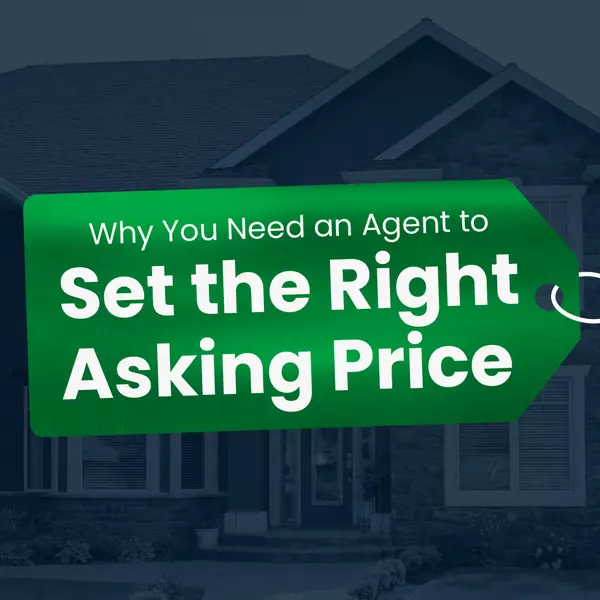

Your House Didn't Sell
How to Sell a House That Didn't Sell Expired If your home has just come off the market and hasn’t sold, don’t be discouraged. The reason it didn’t sell may have nothing to do with your home or the market. In reality, your home may have been one of the more desirable properties for sale. If your listing has expired and you still want results, before you put your home back on the market, take a step back and review your situation. Q. Where should you begin? A. Start by making a commitment to do what it takes to market your house to get it sold. With the right system, the home sale you want is still well within reach. Q. Why didn’t your home sell? A. Review your previous selling plan and you’ll discover that an expired listing usually reflects a problem in one or more of these four major areas: Teamwork Pricing Condition of Your Home, and Marketing Why Don’t Some Houses Sell?4 Important Points That Will Get Your House Sold! 1. Teamwork Your home is a major financial investment, and your relationship with your Realtor® should be a full partnership where your needs and wishes are heard, and you receive detailed and dependable feedback on the progress of your sale. Your agent has a responsibility to source this feedback from the agents who have shown your home, and to communicate this to you so together you can make the right decisions about what to do next. How well did this occur the last time you had your home up for sale? 2. Pricing Did price work for or against you? The “right” price depends on market conditions, competition and the condition of your home. Pricing it too high is as dangerous as pricing it too low. If your home doesn’t compare favorably with others in the price range you’ve set, you won’t be taken seriously by prospects or agents. You’ll get the facts when you see the statistics! To help you to establish a realistic selling price for your home, ask your agent to provide you with an up-to-date competitive market analysis to give you: a review of comparable homes recently sold or currently for sale, an idea of how long other homes have been listed, in order to calculate an average time in which a home can sell in today’s market, a review of homes whose listings have expired, to understand what issues were at play. Note: There is no mention of how much you paid for your home or its improvements. Like any other investment, the market value is determined by what a willing buyer will pay and a willing seller will accept. 3. Condition Of Your HomeShowcase Quality! Is your house someone else’s idea of a dream home? When buyers enter are they inspired? Do they think, “I love this house!” Remember, the decision to buy a home is based on emotion, not logic. A house in move-in condition invites a sale. You need to consider: fixing all the little squeaks and cracks keeping it clean for all showings making it uncluttered brightening it up what your home shows like from the street concentrating on outside curb appeal. Plus — Consider taking care of major items, such having your home painted. Offering an allowance to your prospective buyers, so they can have painting completed is not the same as having done it for them. Now, as they’re trying to imagine what that new paint job will look like, they may also be discounting the price even further because of the less-than-perfect look of those walls. Remember...A house that presents well, sells for the best price because it outshines the competition. Ask your agent if they can arrange a no-obligation inspection of your home to help you assess the above. 4. Marketing...Marketing Your Home To Sell! Some Questions You Should Be Asking! One of the first steps in your marketing plan involves finding an agent who will best represent you. When interviewing agents, test and compare their knowledge and ask each to demonstrate how they will market your home to buyers. Compare, too, how much money each spends on advertising the homes s/he lists, in what media (newspaper, magazine, etc.) and the effectiveness of one medium over the other. Remember, it’s not just how much they spend, but how they spend it. Say goodbye to any real estate agents using old, traditional methods to sell your home because they don’t work in today’s market! To be competitive in today’s marketplace, agents who use new and innovative, nontraditional marketing approaches are the ones who are getting more homes sold fast and for top dollar.
Read More

Divorce and Your Home
Divorce: What You Need to Know About Your House, Your Mortgage, and Taxes How to Avoid Costly Housing Mistakes in the Midst of a Divorce Divorce is a tough situation which opens up many emotional and financial issues to be solved. One of the most important decisions is what to do about the house. In the midst of the heavy emotional and financial turmoil, what you need most is some non-emotional, straightforward, specific answers. Once you know how a divorce affects your home, your mortgage and taxes, critical decisions are easier. Neutral, third party information can help you make logical, rather than emotional decisions. Probably the first decision is whether you want to continue living in the house. Will the familiar surroundings bring you comfort and emotional security, or unpleasant memories? Do you want to minimize change by staying where you are, or sell your home and move to a new place that offers a new start? Only you can answer these questions, but there will almost certainly be some financial repercussions to your decision process. What can you afford? Can you manage the old house on your new budget? Is refinancing possible? Or is it better to sell and buy? How much house can you buy on your new budget? The purpose of this report is to help you ask the right questions so you can make informed decisions that will be right for your situation. 4 Options You have 4 basic housing options when in the midst of a divorce: Sell the house now and divide up the proceeds. Buy out your spouse. Have your spouse buy you out. Retain your ownership. It’s important for you to understand the financial implications of each of these scenarios. 1. Sell the House Now and Divide Up the Proceeds Your primary consideration under these circumstances is to maximize your home’s selling price. We can help you avoid the common mistakes most homeowners make which compromise this outcome. As you work to get your financial affairs in order, make sure you understand what your net proceeds will be - i.e. after selling expenses, and after determining what your split of the proceeds will be. Note that the split may not be 50/50, but rather may depend on the divorce settlement, the source of the original downpayment, and the legislative property laws in your area. 2. Buy Out Your Spouse If you intend to keep the house yourself, you’ll have to determine how you’ll continue to meet your monthly financial obligations, if you now only have one salary. If you used two incomes to qualify for the old loan, refinancing on your own might be a challenge. 3. Have Your Spouse Buy You Out If you are the one who is leaving, you have the opportunity to start again in new surroundings with cash in your pocket. However, be aware that if the old home loan is not refinanced, most lenders will consider both you and your spouse as original co-signers to be liable for the mortgage. This liability may make qualifying for a new mortgage difficult for you if you decide to purchase a home, even though you won’t have legal ownership. 4. Retain Joint Ownership Some divorcing couples postpone a financial decision with respect to the home and retain joint ownership for a period of time even though only one spouse lives there. While this temporary situation means you have no immediate worries in this regard, keep your eye on tax considerations which may change from the time of your divorce to the time of the ultimate sale. When You Decide to Sell If you and your spouse decide to sell your home, it will be important to work together through a professional to maximize your return. Differences aside, you both should be present when a listing contract is put together. Both of you should understand and sign this contract, and both should be active in the ultimate negotiations. When You Buy Your Next Home Use the proceeds from your previous home or buy-out to determine an affordable price range for your next home. Maintain a clear focus on getting the right home to suit your new situation. You may wish to review with an agent who offers a house-hunting service to help find a home that matches your new home-buying criteria.
Read More

Save Thousands
HOMEBUYERS: How To Save Thousands of Dollars When You Buy How Sellers Set Their Asking Price For you to understand how much to offer for a home you ’re interested in, it ’s important for you to know how sellers price their homes. Here are 4 common strategies you’ll start to recognize when you begin to view homes: 1. Clearly Overpriced: Every seller wants to realize the most amount of money they can for their home, and real estate agents know this. If more than one agent is competing for the listing, an easy way to win the battle is to quote the seller an overinflated price. This is done far too often, with many homes that are priced 10- 20% over their true market value. Unfortunately, this is not in the seller’s best interest, because in most cases the market won’t be fooled. As a result, the home could languish on the market for months, leaving the seller with a couple of important drawbacks: The home is likely to be labeled as a “troubled” house by other agents, leading to a lower than fair market price when an offer is finally made. The seller has been greatly inconvenienced with having to constantly have their home in “showing” condition... for nothing. 2. Somewhat Overpriced: About 3/4 of the homes on the market are 5-10% overpriced. These homes will also sit on the market longer than they should. There is usually one of two factors at play here: Either the seller believes in their heart of hearts that their home is really worth this much despite what the market has indicated (after all, there’s a lot of emotion caught up in this issue), OR They’ve left some room for negotiating. Either way, this strategy will cost the seller both in terms of time on the market and ultimate price received. 3. Priced Correctly at Market Value Some sellers understand that real estate is part of the capitalistic system of supply and demand and will carefully and realistically price their homes based on a thorough analysis of other homes on the market. These competitively priced homes usually sell within a reasonable time-frame and very close to the asking price. 4. Priced Below the Fair Market Value Some sellers are motivated by a quick sale. These homes attract multiple offers and sell fast - usually in a few days - at, or above, the asking price. How to Save Thousands of Dollars When You Buy a Home If you’re like most homebuyers, you have two primary considerations in mind when you start looking for a home. First, you want to find a home that perfectly meets your needs and desires, and secondly, you want to purchase this home for the lowest possible price. When you analyze those successful homebuyers who have been able to purchase the home they want for thousands of dollars below a seller’s asking price, some common denominators emerge. Although your agents negotiating skills are important, there are three additional key factors that must come into play long before you ever submit an offer. These Steps Will Help You Save Thousands When You Buy a Home 1. Make sure you know what you want... As simple as this sounds, many homebuyers don’t have a firm idea in their heads before they go out searching for a home. In fact, when you go shopping for a place to live, there are actually two homes competing for your attention: the one that meets your needs, and the one that fulfills your desires. Obviously, your goal is to find one home that does both. But in the real world, this situation doesn’t always occur. When you’re looking at homes, you’ll find that you fall in love with one or another home for entirely different reasons: Is it better to buy the 4-bedroom home with room for your family to grow, or the one with the big eat-in kitchen that romances you with thoughts of big weekend family brunches? What’s more important: a big backyard, or proximity to your child’s school? Far too often people buy a home for the wrong reasons, and then regret their decision when the home doesn’t meet their needs. 2. Don’t shop with stars in your eyes: Satisfy your needs first. If you’re lucky, you’ll find a home that does this and also fulfills your desires. The important thing is to understand the difference before you get caught up in the excitement of looking. 3. Find out if your agent offers a “Buyer Profile System” or “Househunting Service,” which takes the guesswork out of finding just the right home that matches your needs This type of program will cross-match your criteria with ALL available homes on the market and supply you with information on new listings that match your criteria on an ongoing basis. To help you develop your homebuying strategy, use this form: What do I absolutely NEED in my next home: _______________________________ _______________________________ _______________________________ _______________________________ _______________________________ What would I absolutely LOVE in my next home: _______________________________ _______________________________ _______________________________ _______________________________ _______________________________
Read More
Categories
Recent Posts











